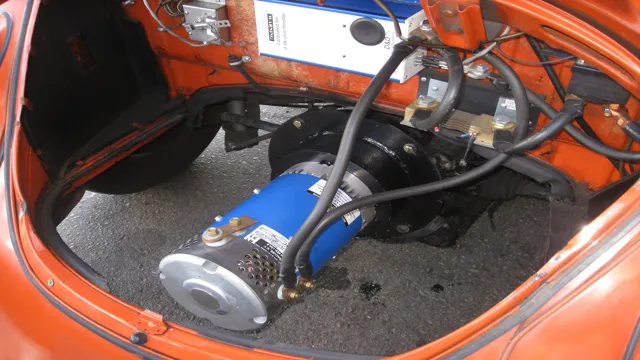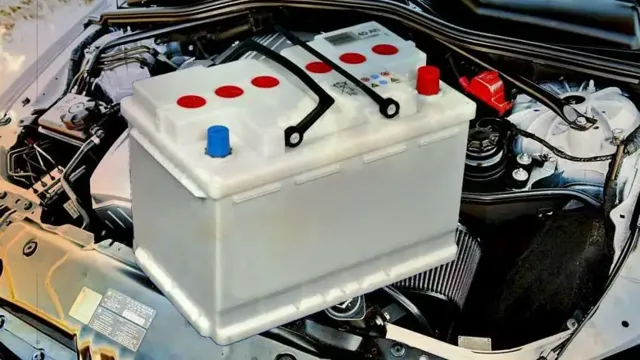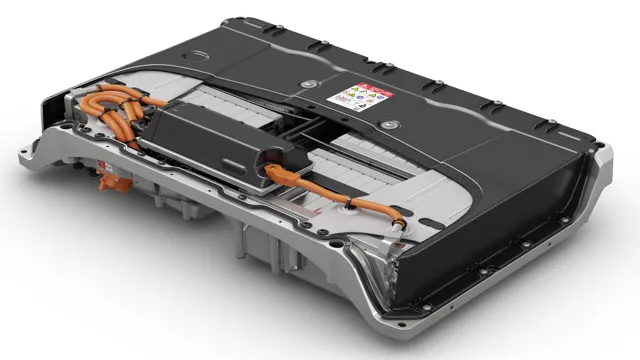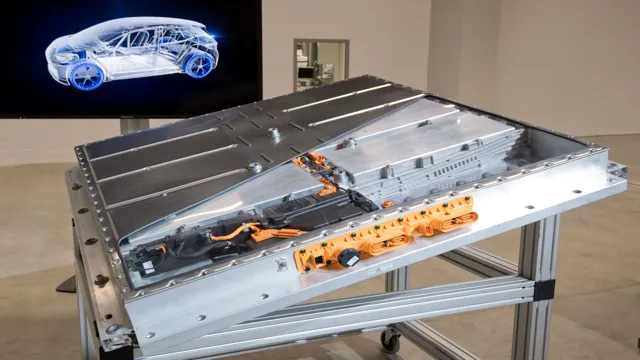Unveiling the Truth: Do Electric Car Batteries Contribute to Pollution?
Electric cars have been touted as the future of transportation, a cleaner, greener alternative to gas-guzzling vehicles. But as their popularity continues to grow, so too does the concern about the environmental impact of the batteries used to power them. While electric cars do contribute less to air pollution than traditional cars, the production and disposal of their batteries can have a significant impact on the environment.
As we move towards a more sustainable future, it’s important to understand the role that electric car batteries play in our efforts to reduce pollution and their potential impact on the environment. In this blog post, we’ll explore the complex relationship between electric car batteries and pollution and what it means for the future of transportation.
Overview of electric car batteries
Electric car batteries are often touted as a more sustainable alternative to fossil fuel-powered vehicles, but many wonder if they cause pollution. The answer is not straightforward, as it depends on various factors. While the batteries themselves do not emit pollutants, their production and disposal can lead to environmental harm.
Manufacturing the batteries requires significant energy and resources, resulting in greenhouse gas emissions and other pollutants. Additionally, when the batteries reach the end of their life cycle, they must be disposed of properly to prevent contamination of soil and water. Despite these challenges, the push towards sustainable energy sources and advancements in battery technology offer hope for a greener future.
So while electric car batteries do present some pollution concerns, they are still a more eco-friendly option overall.
Composition and operation of batteries
When it comes to electric cars, the battery is the essential component that powers the vehicle. Electric car batteries are typically comprised of multiple lithium-ion cells that are linked together to create a pack. These cells work together to store and generate electrical energy that is then used to power the car’s electric motor.
The cells are arranged in series and parallel combinations to create the battery pack’s desired voltage and amperage. As the car is driven, the battery’s management system regulates the power output to ensure optimal performance and longevity. When the battery runs low, it can be recharged by plugging the car into a charging station or using an at-home charging unit.
Electric car batteries have come a long way in recent years, and advancements in their design and technology continue to improve their efficiency and range. As a result, electric cars are becoming a more viable and attractive option for environmentally conscious drivers looking for a clean and sustainable mode of transportation.

Lifespan and disposal of batteries
Electric car batteries have a significant impact on an EV’s lifespan and are responsible for storing energy to power the vehicle’s electric motor. These batteries generally have a lifespan of around eight to ten years, depending on various factors such as temperature, usage patterns, and how well the battery is maintained. Once the battery’s lifespan is over, it may not be able to hold its charge, and the vehicle’s range will be reduced.
At this point, the battery can be either replaced or recycled. Recycling is a better option as it helps reduce the environmental impact of disposing of batteries. Electric car batteries are made from materials that can be hazardous to the environment when not disposed of correctly, which is why recycling is so crucial.
A recycled EV battery can be used in stationary energy storage systems, providing renewable energy storage solutions. Overall, electric car batteries are a vital component of EVs, and their longevity and proper disposal play a crucial role in reducing the environmental impact of transportation.
Environmental impact of electric car batteries
Many people wonder if electric car batteries cause pollution and have a negative impact on the environment. While electric cars themselves do not emit harmful gases during operation, the production and disposal of the battery cells can have a significant environmental impact. The production process of lithium-ion batteries, which are commonly used in electric cars, requires the extraction and processing of raw materials such as lithium, cobalt, and nickel.
This process can lead to toxic metal and chemical pollution of water and soil in the areas surrounding mining operations. Additionally, at the end of the battery’s lifespan, there is the issue of disposal. Incorrectly disposed batteries can leak toxic chemicals into landfills and harm the environment.
However, steps are being taken to address these concerns, including the development of more sustainable and ethical mining practices, battery recycling programs, and the use of alternative battery technologies. While the environmental impact of electric car batteries is still a valid concern, the larger picture must be considered, and the long-term benefits of using electric cars over traditional gas cars in terms of reducing emissions and protecting the planet must be taken into account.
Carbon footprint of battery production
The production of electric car batteries has been a topic of growing concern regarding its environmental impact. The manufacturing process of electric car batteries requires a significant amount of energy, which can lead to a higher carbon footprint compared to the production of conventional car batteries. This is due to the fact that electric car batteries are made from a variety of metals, including lithium, cobalt, and nickel, all of which need to be mined and processed using energy-intensive methods.
Furthermore, the transportation of these materials to battery production facilities also contributes to the carbon footprint. On the other hand, it should be noted that electric vehicles have the potential to significantly reduce transportation emissions over their lifetime, especially if they are charged with renewable energy sources. Therefore, it is crucial to continue research and development into more sustainable and environmentally-friendly battery production methods that can enable the transition to a low-carbon future.
Emissions from battery charging and use
Electric car batteries have been hailed as environmentally friendly, but it’s important to consider the emissions associated with their charging and use. While electric cars produce zero emissions on the road, emissions are created during the charging process, whether from the electrical grid or renewable sources. The manufacturing process of the batteries also has a significant environmental impact, with resource extraction, transportation and disposal being major concerns.
The batteries contain heavy metals and toxic chemicals, and their disposal at the end of their life cycle must be done responsibly to prevent large-scale environmental damage. Overall, while electric car batteries have the potential to significantly reduce emissions, it’s important to take into account the entire life cycle of the batteries to fully understand their environmental impact.
Impact on mining and resource depletion
The increasing popularity of electric cars, while addressing the issue of carbon emissions, is having a significant impact on mining and resource depletion. Lithium, cobalt, and nickel are essential components in electric car batteries, and their extraction puts a significant strain on our environment. Mining activities emit toxic chemicals, causing water and soil contamination, deforestation, and habitat destruction.
Additionally, the extraction process requires a vast amount of water, which further exacerbates the scarcity of this precious resource. However, industries are trying to create more sustainable mining options by using renewable energy sources and recycling batteries. This approach will reduce the impact of electric car batteries on the environment and lead to more sustainable mining practices.
Overall, while electric cars are a step towards a cleaner environment, addressing the environmental impact of their batteries must be a major priority.
Comparing electric car batteries to traditional car fuel
When it comes to comparing electric car batteries to traditional car fuel, the question of whether or not electric car batteries cause pollution is on many people’s minds. It’s true that the production and disposal of electric car batteries can have an impact on the environment. However, when compared to the emissions caused by burning fossil fuels, the pollution caused by these batteries is significantly less.
Electric car batteries have the potential to reduce harmful emissions and improve air quality, but it’s important to continue finding ways to improve their production and disposal methods. Overall, electric car batteries are a more sustainable and environmentally friendly option compared to traditional car fuel.
Emissions from fossil fuel extraction and transportation
Electric car batteries vs traditional car fuel when it comes to emissions from fossil fuel extraction and transportation. Electric cars run on battery power rather than traditional gasoline and diesel fuels. This means that they don’t produce the same emissions from fossil fuel extraction, transportation, and combustion.
While electric car batteries do require mining and processing of raw materials, the emissions produced during these activities are significantly less per unit of energy produced compared to traditional fossil fuels. Also, electric cars can be charged using renewable energy sources such as solar, wind, and hydropower, which effectively reduces their total carbon footprint. On the other hand, traditional fuel-powered cars rely on fossil fuels to operate, resulting in high levels of greenhouse gas emissions and air pollution.
Overall, the shift towards electric cars is a crucial step towards reducing our carbon footprint and addressing climate change for a better tomorrow.
Emissions from combustion of fuel in traditional cars
When we talk about emissions from combustion of fuel in traditional cars, the first thing that comes to mind is the high levels of greenhouse gases like carbon monoxide, nitrogen oxides, and particulate matter they emit. These emissions are detrimental to the environment and human health, contributing to air pollution, global warming, and climate change. In comparison, electric car batteries are a much cleaner option, as they do not produce the same level of emissions.
While it is true that electric car batteries require metals and minerals that must be mined, and the production of these batteries can contribute to increased emissions, the overall benefits of electric cars outweigh their environmental costs. Moreover, traditional car fuel is a finite resource that is rapidly depleting, while electric car batteries can be recharged from renewable energy sources such as solar and wind power. So, when it comes to comparing electric car batteries to traditional car fuel in terms of emissions, it is clear that electric cars are the more sustainable and environmentally friendly choice.
Conclusion
In conclusion, the question of whether electric car batteries cause pollution can be summed up with a witty and clever explanation. Just like the age-old philosophical riddle of “If a tree falls in a forest and no one is around to hear it, does it make a sound?”, the answer to this question may depend on the parameters defined. While electric car batteries themselves may not emit pollution during use, their production and disposal can have negative impacts on the environment.
Therefore, the question should be rephrased to ask whether the use of electric cars contributes less to pollution than the use of traditional gasoline-powered cars. The answer to that question is a resounding yes, making electric cars a cleaner and more sustainable option for the future of transportation.
FAQs
What types of pollutants do electric car batteries release?
While electric cars do not produce emissions directly, the manufacturing and disposal of batteries can release pollutants such as sulfur dioxide, lead, and other hazardous chemicals.
How can electric car battery recycling help reduce pollution?
Electric car battery recycling can help reduce pollution by reducing the need for new materials and decreasing the amount of hazardous waste that ends up in landfills.
Does the use of renewable energy sources for charging electric cars reduce pollution?
Yes, using renewable energy sources such as solar or wind power to charge electric cars can significantly reduce pollution compared to using fossil fuels.
Are there any regulations in place to ensure responsible disposal of electric car batteries?
Yes, many countries have regulations in place to ensure responsible disposal of electric car batteries, including guidelines for recycling and safe disposal of hazardous materials.





